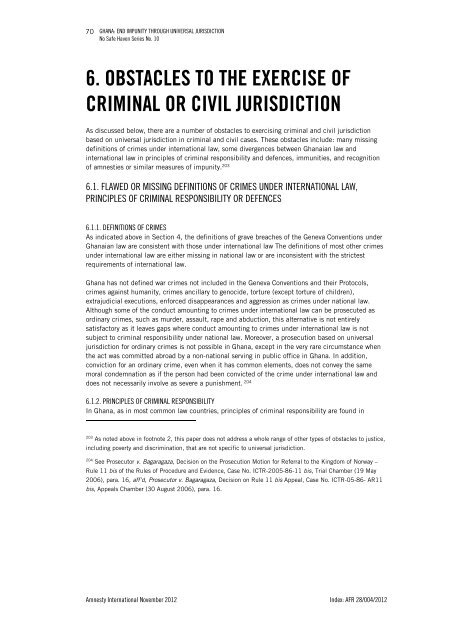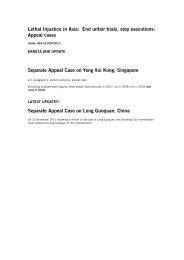Ghana - Amnesty International
Ghana - Amnesty International
Ghana - Amnesty International
Create successful ePaper yourself
Turn your PDF publications into a flip-book with our unique Google optimized e-Paper software.
70GHANA: END IMPUNITY THROUGH UNIVERSAL JURISDICTIONNo Safe Haven Series No. 106. OBSTACLES TO THE EXERCISE OFCRIMINAL OR CIVIL JURISDICTIONAs discussed below, there are a number of obstacles to exercising criminal and civil jurisdictionbased on universal jurisdiction in criminal and civil cases. These obstacles include: many missingdefinitions of crimes under international law, some divergences between <strong>Ghana</strong>ian law andinternational law in principles of criminal responsibility and defences, immunities, and recognitionof amnesties or similar measures of impunity. 2036.1. FLAWED OR MISSING DEFINITIONS OF CRIMES UNDER INTERNATIONAL LAW,PRINCIPLES OF CRIMINAL RESPONSIBILITY OR DEFENCES6.1.1. DEFINITIONS OF CRIMESAs indicated above in Section 4, the definitions of grave breaches of the Geneva Conventions under<strong>Ghana</strong>ian law are consistent with those under international law The definitions of most other crimesunder international law are either missing in national law or are inconsistent with the strictestrequirements of international law.<strong>Ghana</strong> has not defined war crimes not included in the Geneva Conventions and their Protocols,crimes against humanity, crimes ancillary to genocide, torture (except torture of children),extrajudicial executions, enforced disappearances and aggression as crimes under national law.Although some of the conduct amounting to crimes under international law can be prosecuted asordinary crimes, such as murder, assault, rape and abduction, this alternative is not entirelysatisfactory as it leaves gaps where conduct amounting to crimes under international law is notsubject to criminal responsibility under national law. Moreover, a prosecution based on universaljurisdiction for ordinary crimes is not possible in <strong>Ghana</strong>, except in the very rare circumstance whenthe act was committed abroad by a non-national serving in public office in <strong>Ghana</strong>. In addition,conviction for an ordinary crime, even when it has common elements, does not convey the samemoral condemnation as if the person had been convicted of the crime under international law anddoes not necessarily involve as severe a punishment. 2046.1.2. PRINCIPLES OF CRIMINAL RESPONSIBILITYIn <strong>Ghana</strong>, as in most common law countries, principles of criminal responsibility are found in203As noted above in footnote 2, this paper does not address a whole range of other types of obstacles to justice,including poverty and discrimination, that are not specific to universal jurisdiction.204See Prosecutor v. Bagaragaza, Decision on the Prosecution Motion for Referral to the Kingdom of Norway –Rule 11 bis of the Rules of Procedure and Evidence, Case No. ICTR-2005-86-11 bis, Trial Chamber (19 May2006), para. 16, aff’d, Prosecutor v. Bagaragaza, Decision on Rule 11 bis Appeal, Case No. ICTR-05-86- AR11bis, Appeals Chamber (30 August 2006), para. 16.<strong>Amnesty</strong> <strong>International</strong> November 2012 Index: AFR 28/004/2012
















